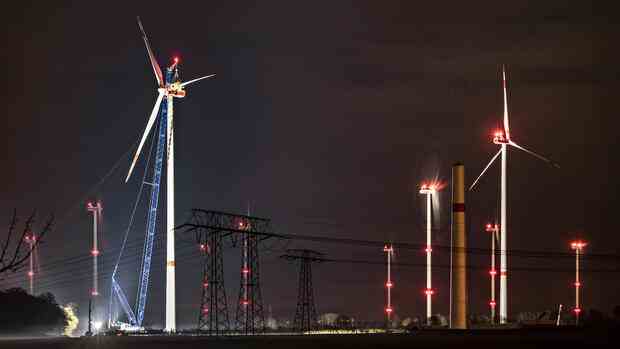Berlin Just a few days ago, Federal Minister of Economics Robert Habeck (Greens) made it clear what he believes is crucial for a faster expansion of renewable energies: “It is important that the local approval authorities create a new dynamic,” he said on Thursday Week. The acceleration of the expansion must be “driven from below”, the authorities must also actually implement procedural simplifications. Unfortunately, administrative practice cannot be changed with a snap of the fingers.
In fact, there is still no sign of the statutory acceleration of the approval process in practice. This is confirmed by a survey of project developers conducted by the management consultancy McKinsey for the Handelsblatt.
Accordingly, the companies rate complex processes as the main hurdle – ahead of staff shortages and scarce components and materials. “The regulatory environment is by far the biggest problem for project developers. They desperately want simpler and faster processes,” says Alexander Weiss, director of global energy at McKinsey.
In addition, companies find it a significant burden that the conditions for approvals are constantly being changed in ongoing processes. “They want a more reliable framework overall,” says Weiss.
Accelerating the expansion of renewable energies is considered crucial for a successful energy transition. By 2030, 80 percent of the electricity produced in Germany should come from renewable sources. So far, the value is around 50 percent.
However, it can be assumed that power consumption will increase significantly due to more power-based applications. The number of e-cars is expected to increase. In addition, six million electric heat pumps are to be in use by 2030. It’s around a million at the moment.
>> Read here: When will e-cars become cheaper than combustion engines?
In order to increase the pace of expansion, the federal government decided on the so-called “Easter Package” almost a year ago. It contains a whole series of measures intended to shorten the approval process. According to the legal definition, the expansion of renewables is now “in the overriding public interest” in order to take precedence over other concerns in administrative practice.
In addition, approval procedures are streamlined and bureaucratic hurdles are removed. The traffic light also stipulated the two percent target: two percent of the country’s area should be available for wind energy by 2032 at the latest. So far it’s less than one percent.
Expansion of photovoltaics is progressing too slowly
Support is also coming from Brussels. Shortly before Christmas last year, the EU Council of Energy Ministers agreed on a series of measures that should also advance the expansion of renewables. Among other things, they agreed to simplify standards for nature conservation assessments.
According to the McKinsey survey, the success of the measures is still limited. “The project developers say that there is still no sign of the federal government’s Easter package in terms of the approval process,” says Weiss.
With the expansion of photovoltaics from 2021 to 2022, there was an increase from 5.7 gigawatts (GW) to 7.3 GW. But that is far from sufficient. “After all, from 2026, 22 GW will have to be installed every year. We are still a long way from this value,” says Weiss.
The situation is similar with wind power. “Currently, more than eight GW of onshore wind farms and 2.8 GW of offshore wind farms are in various stages of planning,” says Weiss. In order to achieve the goals of the Easter package, however, a gross increase of almost 13 GW of onshore wind farms and seven GW of offshore wind farms will be required in Germany by 2025.
Christoph Strasser, CEO of the project developer Maxsolar, shares the criticism of the length of the procedure. “Unfortunately, lengthy approval procedures are part of our everyday life. We’re working on a photovoltaic project, and it took three years to get approval,” reports Strasser. The Easter Pack improvements gradually took effect. “Since they only came into force at the beginning of the new year 2023, it will still be a while before they take full effect,” says Strasser.
Strasser defends the authorities. You can’t blame them. “They only have limited personnel capacities and at the same time are exposed to a wave of applications,” says the project developer. From Strasser’s point of view, it would be “desirable to introduce automated approval procedures”. A suggestion that is very popular among project developers.
Supply chains are no longer a problem
In the McKinsey survey, standardized processes are among the wishes frequently mentioned. Weiss sees the Netherlands as a role model for faster approval procedures. There is a central IT platform for the approval of wind power projects. “Companies can handle the entire process from submitting the documents to answering questions about them,” says Weiss.
At the same time, the survey shows that the project developers are optimistic despite the bureaucratic hurdles: 65 percent state that they want to further expand their development pipeline in Germany in the future.
For the project planners, the supply chain problem seems to have been largely solved: “What is surprising from our point of view is that the availability of components and materials is not such a big problem for the project developers,” says Weiss. According to the interviewees, the financing of the projects is not difficult either.
According to McKinsey, the 23 project developers who took part in the survey account for around two-thirds of the German market volume.
More: Germany must build six wind turbines a day by the end of 2029

